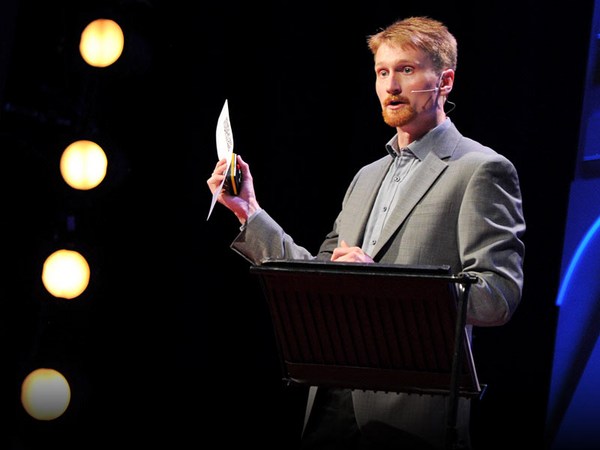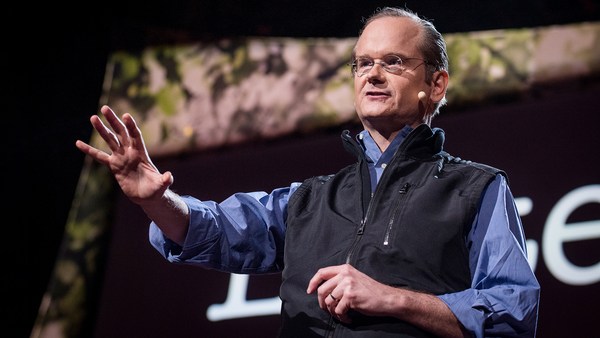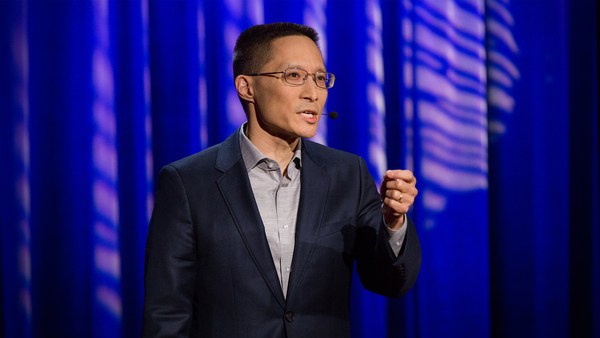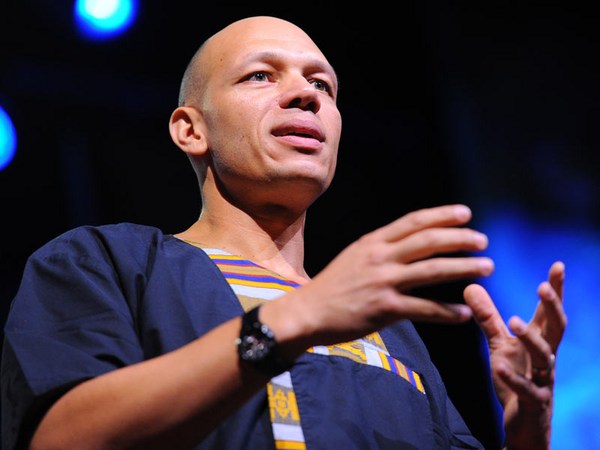David Troy: Hello and welcome to TEDxMidAtlantic Coronavirus Conversations, a series of videos we're producing via videoconferencing technology to address some of the most pressing issues that we face during this ongoing public health crisis. I'm David Troy, host and co-curator of TEDxMidAlantic. Today, I'm joined by Avi Rubin, professor of computer science at Johns Hopkins University in Baltimore, Maryland. Avi is an expert on election technology and is a TEDxMidAtlantic speaker. Welcome, Avi. Avi Rubin: Thanks, Dave. Glad to be here. DT: So, I wanted to ask you - many states are currently considering converting their elections that are currently in person into mail-in elections on very short notice. Do you think this is feasible, and what other options might there be? AR: I understand why they want to do that. Obviously, it's a time that is potentially dangerous for people to gather together like they would in a polling place. I'm a bit concerned about the logistics of, like you say, such a short notice and such a short timeframe to switch something that's been planned for years to a system that has not been tested in certain places. We have several states, including Oregon, that are vote-by-mail and have been vote-by-mail for the last few elections, and for them, this is going to be a lot easier. But if you take a state like our state of Maryland, where we have predominantly poll-site voting, I don't know how logistically complicated it would be in the short amount of time that we have to switch to mail-in voting. DT: And I think some people are just thinking, well, why can't we just use an app? You know, we buy things with credit cards and do all kinds of secure banking and whatnot over apps. Why can't we just, you know, vote by app? What are the issues for, you know, sort of regular people to understand in terms of why this doesn't really work? AR: I can really appreciate that people are going to that and thinking that it would be very convenient and would solve the problem that we have right now to go to an app and to do this over the internet. Unfortunately, I think that the security problems are real nonstarters there. Even in the case where you have years to plan, which we don't have right now, you end up with too many security risks that we don't know how to resolve. And in a case of a presidential election like the one that we have coming up, there's high incentive for there to be interference. We know that Russia, for example, has been proven to have interfered in the last election, and it's believed they're going to try to interfere in this one. By moving to an app or an online election, we would give the people that want to do harm to our election the perfect platform for them to interfere. Another problem with that is that even if they don't interfere with the election, it would be very easy to create a perception that they had done that. And so if the outcome of the election comes into doubt, then we have a very big problem on our hands. DT: That makes a lot of sense. And so from a sort of technical standpoint, I think, you know, there's a particular kind of attack that people might employ to try to defeat something like a presidential election, you know. We obviously have a variety of down-ballot elections that are coming, but maybe they won't receive as much attention as, say, the general election in November. What are some kinds of attacks that people might try to employ if we were to try some kind of internet voting scheme? AR: There are many different concerns that we would have. One of them, for example, is that an attacker - let's say we're using a website and an app that goes to a particular location on the internet to do the voting. A malicious actor could set up a site that was rogue that looked just like the real site and would fool - maybe not all the tech-savvy people out there - but enough people that they would think they had actually voted. And so what an attacker could do would be to, say, target a particular demographic, a certain area that tends to vote in the opposite way that the attacker wants them to vote. And not only could they disenfranchise people by making them think they had voted and just not having them have voted, but it's possible that in that process, they could collect whatever credentials or other authenticators the voters would be providing and use those to place votes on behalf of those voters for the other candidate. And so one of the problems with the internet is that while it's convenient and it's ubiquitous and it's online, it is something that doesn't have the kind of strong authentication that a poll worker can do when a person walks into the polling station and presents themselves to vote. DT: So, I guess, really what you're saying is that people might cast votes that, in fact, are not being counted because they're going to a fake site. And then, you know, likewise, people, you know, might be staging attacks where they cast votes into a system and they're not really coming from real people. Is that how you would summarize it? AR: Right. The authentication has to happen in both directions. The voters have to know that they're actually in the election and they've gone to the right site and that they're voting, and the election process needs to know that the voters presenting themselves to vote are the real people that are in fact needing to cast those ballots. DT: Right. So I think that that's a pretty powerful argument for why an internet-based system is just not really an option right now. Now, you know, I think one of the things people don't really think about is the anonymity requirement with voting. Can you maybe talk a little bit more about that and why that's important? AR: So in America, in our democracy, we have a right to vote anonymously so that nobody knows how we voted. And this is important for several reasons. One of the reasons is for voter coercion - you don't want your boss at work to know how you voted. Another is to protect against an authoritarian government - that might have repercussions if you don't vote a certain way. So by ensuring the anonymity of the vote, we are giving personal liberties and protections to people. Unfortunately, it is very difficult in an online system to maintain that type of anonymity and yet still authenticate a user. One example that's often given when people argue for using more technology in elections is that we do our banking online, and banking is a very sensitive process that involves our real money. And yet how many people would be willing to bank online if the bank had a policy of not maintaining a link between your activity and your identity? You would never be able to go back and prove that you hadn't withdrawn this money from your account, and that would be a pretty scary position to be in. And yet that's exactly what's being proposed if we think about moving our elections online. DT: Right, and, you know, so I guess, looking at the near-term, over the next six months in 2020, many of the primary elections have already been completed - there are still some remaining. It looks as though Joe Biden probably has a lock on the Democratic nomination and, of course, Donald Trump is the presumptive Republican nominee. So, you know, to some extent, the presidential primaries are sort of solved. But here in Maryland, they've moved the primary election from April 28th to June 2nd, and, you know, we still don't really know if we'll be able to have an in-person election in June. I suppose that, you know, we may need to look at turning that as well into a mail-in ballot. But I think the real issue is November. We've got a very important election coming up in November, and some folks have raised the concern that, you know, there may be a possibility that the election could be canceled. Could you speak to that possibility and, like, how do we deal with this? AR: I think it's really important that no matter what happens, we not cancel the election. It's a fundamental part of our democracy that every four years, we elect a new president or reelect a president, and the people need to choose. In particular, right now, our country is very divided and we have very strong feelings on both sides of the aisle. And I don't think that the Democrats, for example, would be willing to have Donald Trump continue his presidency beyond the time that he's allowed it by the Constitution. And so it's very important that we figure this out. I think it's a very hard problem. It gives me the idea of like "Apollo 13" - you know, "Failure is not an option." We have to figure out how to run the election, and we might need to make some compromises on security, convenience - all of the above. None of these are going to be solutions that are going to make us very happy. But we're in a crisis. We're in the perfect storm of a global pandemic right at the time that our election has hit, and we may need to hold our nose and just say, "Okay, this is the system we're going to use," whether it's a scramble to do mail-in ballots - perhaps we allow people to download the ballot over the computer if they have that ability to do that. I've never been a fan of that, but we've never been in this type of a crisis before. And so we need to put all options on the table, give them consideration, and figure out which of these is the least bad option that's going to allow us to complete the election. DT: And I think, you know, one thing that is on a lot of people's minds is representation and equity. You know, to the extent that any significant technology change, you know, or a decision on how we distribute ballots and that kind of thing has an impact on who's able to vote - you know, I think that that's a big concern. Are there ways that we can maybe address, you know, that concern? AR: I understand that concern. You know, not everybody has the ability to go to the internet, download a ballot, print the ballot, fill it out, and mail it in. And in fact, the people that don't have that ability tend to be in a particular political group. And so it's important that we make every effort to think about and brainstorm about distribution methods that will not enable ballot stuffing and not enable people to share or sell or otherwise have other people take their ballot from them and yet will give access to as many people as possible to participate in the election process. You know, this virus has caused a lot of inconveniences and a lot of cancellations, and I think it's bringing out the best in some people and the worst in other people. And what we need to do is make sure it brings out the best in us in terms of running this election. And everybody needs to be patient and willing to accept things that they wouldn't accept if we weren't in crisis mode. But we are in crisis mode, and we all need to do our part and make this election happen to the best of our ability and know that it is not going to be perfect, but we have to try to make it good enough. DT: Sure - and I suppose that no matter what the outcome is, you're going to have a significant percentage of people that are unhappy with it, and that's going to be a challenge. But, as you said, we want to make sure that, you know, whatever happens, we have the appearance of having done the absolute best that we can in terms of actually managing this process so that, you know, when it is finally said and done, there's at least trust in it. And I think, you know, one thing that I've heard raised is the possibility of doing a combination of, say, a mail-in system plus, say, extended early voting - perhaps having to implement social distancing at polling places. But that also seems like it might be problematic in terms of potentially exposing people to, you know, risk in order to vote. Have you heard any thoughts on how that might be able to be managed? AR: Well, I think we need to see how the virus develops. We do have a couple of months before even the rescheduled primaries happen. We may very well be in the situation where the restrictions are even tighter on people moving around than they are right now. If we look at California and New York, that have basically locked down - and other places are following suit - we need to consider the possibility that we won't be able to do anything in person. Now, if things don't get worse and they actually get better, then we can possibly implement that. But the problem is that we need some time to plan whatever it is that we're going to do, and we just don't have a lot of time. DT: Well, I appreciate you taking some time to sit down with us today and kind of go through this because a lot of people are very concerned about where this is going and are trying to make sure that we come up with a solution. Are there any things that you would recommend for people in their states in terms of things that they could be doing to, you know, start thinking this process through at the local level? AR: Yes, I think that people should make it clear to their election officials that they want to be cooperative. I think election officials need to focus primarily on transparency. We want to minimize the number of people who are not satisfied with the election process that we had. And one of the ways to do that is to be very transparent and share with the public everything about the process, what the trade-offs are, what the decisions are that were made. And when people volunteer to help, whether it's to drive around and deliver ballots or to drive around and collect ballots or any other tasks that the election officials determine is needed in order to make this run smoothly, they should be willing to help out with that. DT: That makes a lot of sense. And just, you know, to be clear, the elections in the United States are a function of state and local governments. They're not, say, like, federally run. So, you know, even if there's some kind of federal idea to cancel the election, it seems to me it's not really feasible. Like this is something that's happening at the state and local level, and so, probably, the role of citizens is to try to be as supportive as possible as that process, you know, tries to go through to completion. AR: Absolutely. I think a cancellation of the election is not on the table, and it's the worst possible outcome. And so we need to get all hands on deck and say we're going to make it happen, we're going to help out. And let's do the best we can, and we'll push forward. DT: That sounds like great advice. And I know that so many people right now are coming together to try to solve really hard problems. So I appreciate you sharing your voice and insights with us today. It's, I think, going to help give people a much better understanding of how this process may unfold and maybe what's happening next. So again, thanks, Avi, for being here today. We appreciate it, and we'll talk to you soon. AR: Sounds good. Thank you.
Related talks

David Bismark: E-voting without fraud

Christina Greer: Does your vote count? The Electoral College explained

Lawrence Lessig: We the People, and the Republic we must reclaim

Tiana Epps-Johnson: What's needed to bring the US voting system into the 21st century

Eric Liu: There's no such thing as not voting
